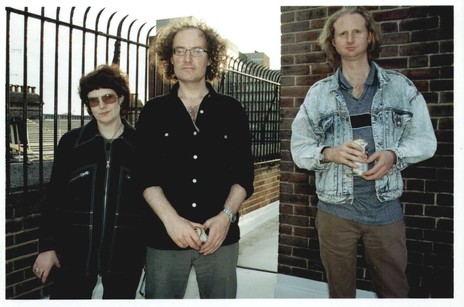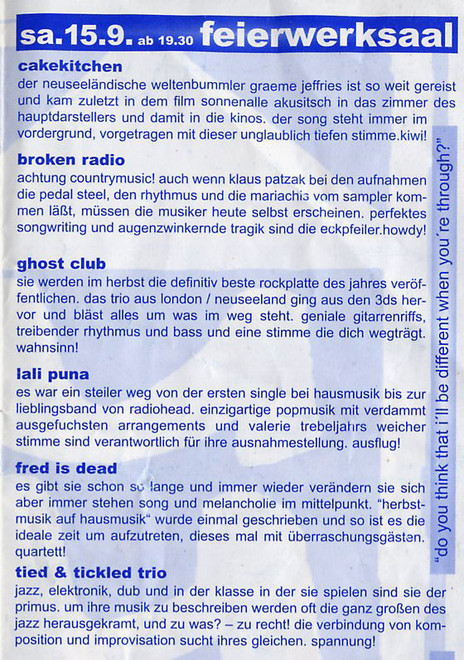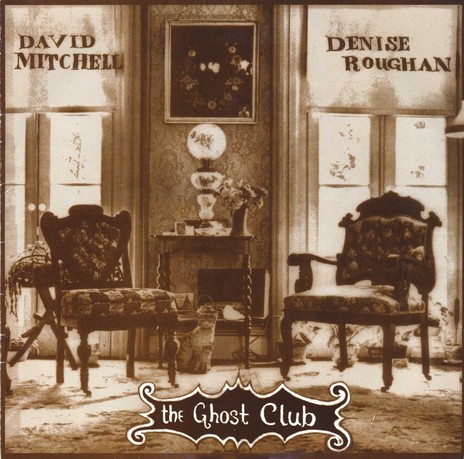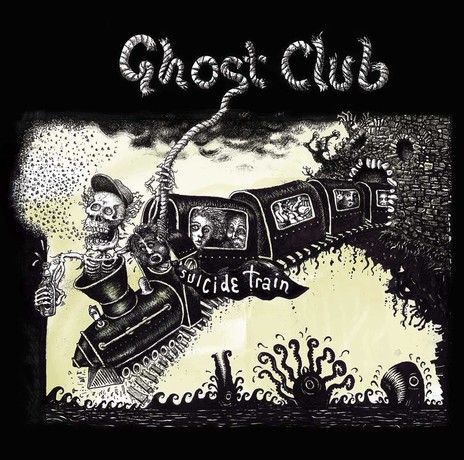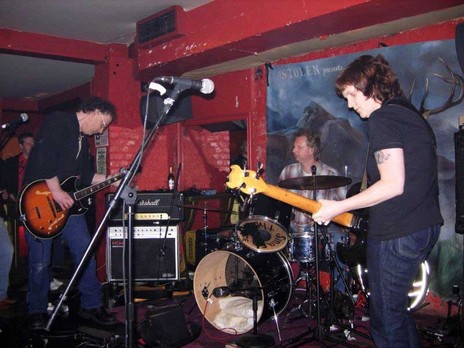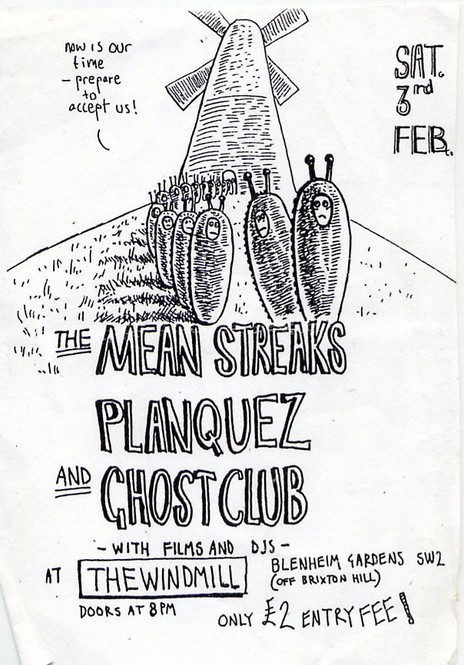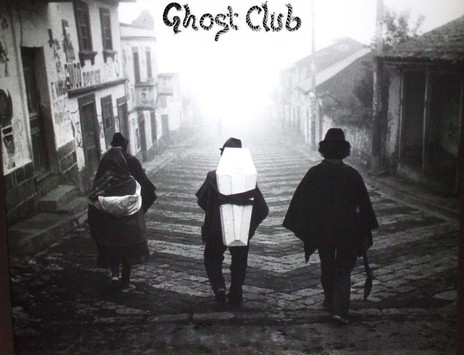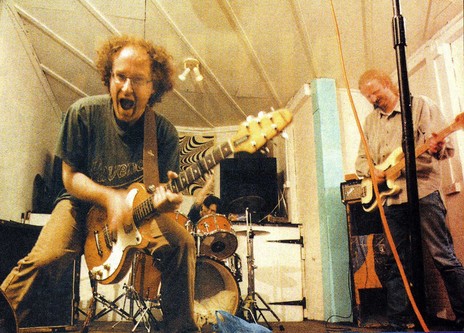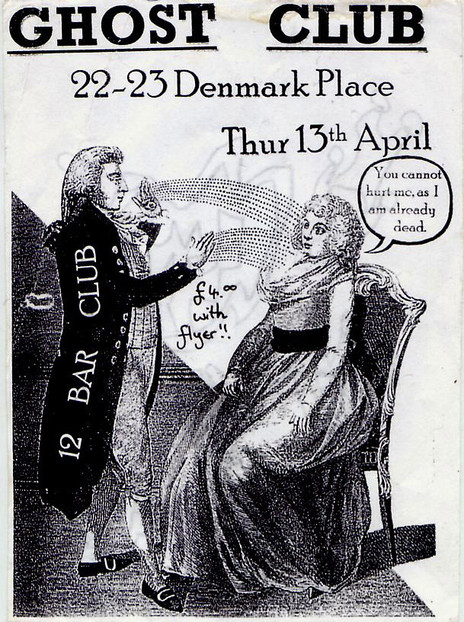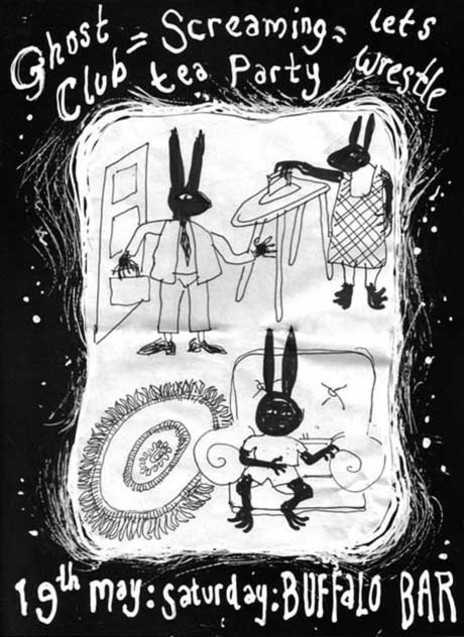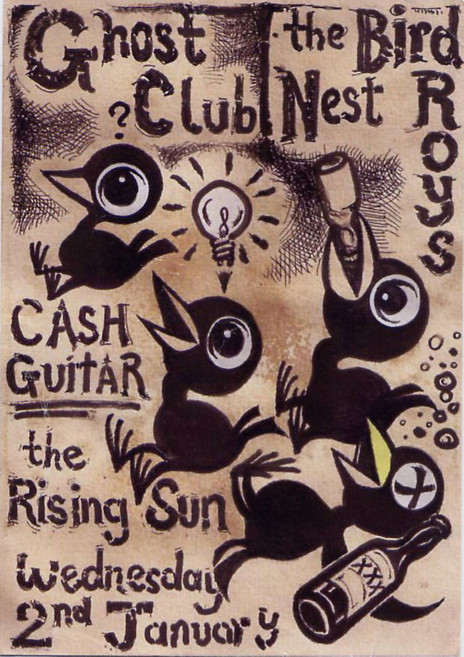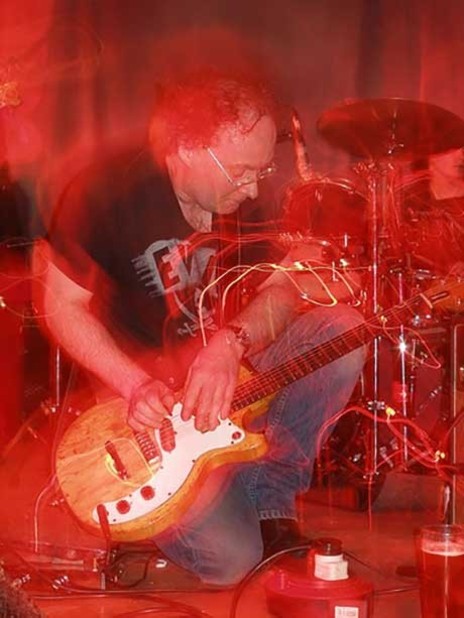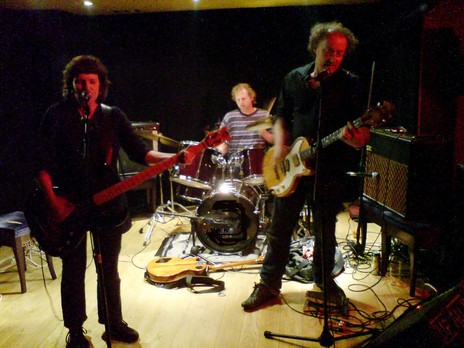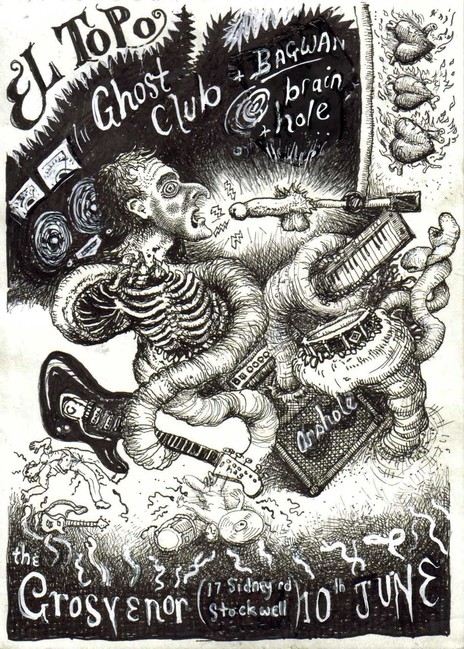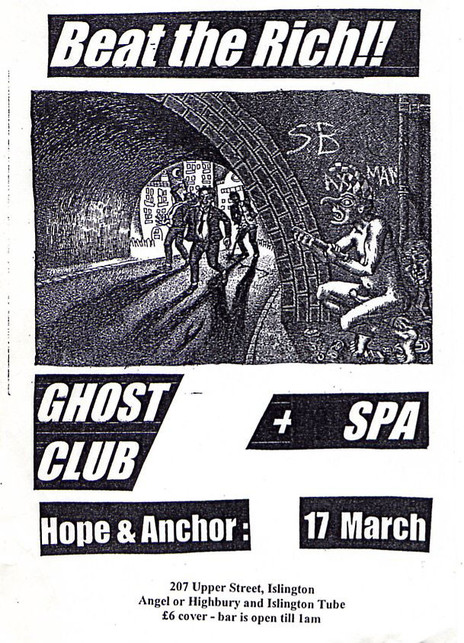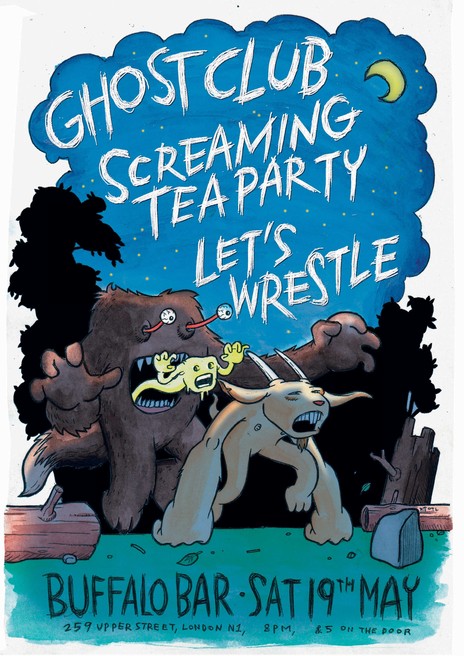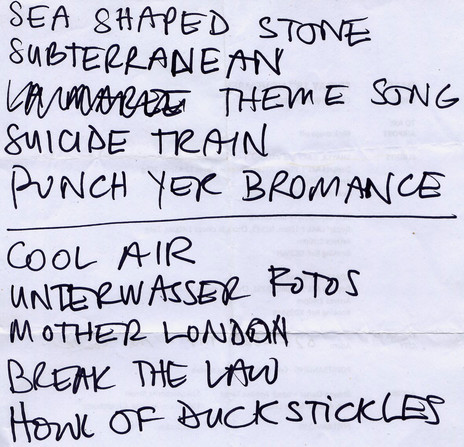Though their band had broken up, guitarist Mitchell and drummer/ bassist Denise Roughan got together and made the shift to London. As Roughan remembers it, “We wanted a change of scenery, and from what we both knew of London we really loved it and wanted to have a crack at living there. So that was kind of the end of The 3Ds … we ran out of steam, basically.” (Musical Chairs, Radio New Zealand National, 19 November 2011)
Ghost Club bassist/ drummer Jim Abbott recalls their portentous arrival. “Dave accidentally left a bag containing his wah wah and various other effect pedals at Victoria Station. The police were called, rush hour trains were cancelled and the station was evacuated until it was confirmed that the bag didn't contain a bomb. When they got hold of Dave the police asked, “Have you got any idea what you've done?' " (interview with the author, 2015)
Abbott’s name was a new one to most NZ rock and pop train spotters, his CV not as canonical as the rest of Ghost Club. His earliest band, Selwyn College’s self-deprecating The Worst, saw Abbott on drums, with Peter McLennan (Hallelujah Picassos) on guitar and Troy Ferguson (long time 95bFM radio host and music writer) on bass. A posthumous cassette comp released in 1984 rated an enthusiastic Chris Knox review in RipItUp. The Worst birthed an experimental side project, The Jellys, with Abbott, Ferguson and Simon Josey on small and homemade instruments, and tape loops.
Abbott first met Mitchell in 1985 and met Roughan around the time he was playing bass with the short-lived Toad (1991-92), which featured former Axel Grinders John Segovia, Duane Zarakov and Celia Mancini, with Abbott on bass. “We only played live a couple of times,” says Abbott. “I went away to Wellington for a few weeks and when I came back to Auckland, Shaft and King Loser had formed and Toad were no more.”
After Auckland, Abbott landed in London in 1993, and formed the Club with Roughan and Mitchell when they arrived in 1997. “Our first practice was in my fourth floor council flat at the Elephant and Castle in South London using small amps and a child's drum machine.” (Abbott)
This first duo version of The Ghost Club recorded a subdued acoustic single of the same name for Flying Nun in 1996.
Mitchell and Roughan had already worked together on a quieter, more free form foetal version of what would become The Ghost Club while they were still The 3Ds. This first duo version of The Ghost Club recorded a subdued acoustic single of the same name for Flying Nun in 1996; two small songs worlds away from the squawk and swirl of the trio’s following albums, candle-lighting a lamb-like Mitchell and dove-like Roughan.
They had first recorded as a twosome in 1991 – only a year after The 3Ds debut EP Fish Tales – on the Xpressway-pressed 7-inch, Dead Dog In Port Chalmers. Their collaborative flipside to a pair of Mitchell-penned-and-played tunes (made with a bedroomishness somewhere between Chris Knox and Crude) ‘The Grey Funnel Line’ is a traditional sea shanty salt-crusted by Mitchell’s soaring overdrive drones, and iced with Roughan’s pure Mo Tucker vocal. This track is really the Ghost of Clubs Yet to Come, straddling the tender self-titled 7-inch and thundery, buzzing albums.
The new trio’s first album, Ghostclubbing, was recorded in two days at their practice room in a Bermondsey railway arch. The band were being booted out of the space by their relocating landlord, and this urgency lends the album a loose energy, fast and bulbous. “We recorded all the live stuff pretty much in one day, and there’s only one guitar overdub, a couple of vocal overdubs and added slide guitar to one song. It was all done so quickly we barely realised we’d recorded it when we got up on the Monday.” (Mitchell, Otago Daily Times, 25 August 2001)
Just as the latent spirit of Ghost Club lurks in The 3Ds, on darker, harder tracks like Strange News From The Angels’ ‘Animal’, there’s a 3-Dimensionality to the Ghost Club – mostly Mitchell’s lispy rasp and the unmistakable shriek as he rakes his guitar. But they are entirely their own clique: a stripped-back ripping three-piece, dusted and greasy, riffing on the difference of gritty Mother London to good old Godzone. Ghostclubbing’s ‘Unterwasser Fotos’ is akin, for instance, to Hellzapoppin’s ‘Sunken Head’, but flayed of that track’s anthemic, alt-arena-rock studio production (along of course, with those other D’s: David Saunders and Dominic Stones), leaving a garage-y, lo-fi, elemental jam-metal. And with Abbott and Roughan regularly swapping jobs, the drumming is an altogether different beast, as is the bass half the time.
“[Ghost Club’s] music is a bit heavier and a bit harder even when we are being a little bit more sort of gentle with it. I drum in half the music, and [Jim’s] a much rockier sort of drummer than I am. I think my sense of rhythm is probably stronger than my sense of melody. That’s why I became a drummer ... it’s probably my favourite instrument to play, really.” (Roughan, Musical Chairs, 2011)
Whereas roughneck heavy retro-rockers The Datsuns brought in a brontosauric John Paul Jones to produce their second album, Ghost Club beat their own previous feat, cutting second album Suicide Train in just one cold January day (another Paul Jones, brother of The Exponent's Brian Jones, is listed in the production credits), in the icy basement of the Mitre Freehouse, a busted-up old pub in Hackney where expat Matthew Hyland (ex-S.P.U.D. and a Mitchell collaborator) was squatting.
Suicide Train is steeped in that seeping underground cold. The instruments are all quite forward in the mix, with a burning immediacy and chugging tension, thrumming like a live show. You can practically see their steamy breath and the sweating cellar stones, the guitar’s high frequencies brittle, Roughan’s tremoloed vocal chorus on ‘Subterranean‘ shimmering like a shiver.
Ghost Club played regularly throughout London, a few times in Brighton, and on the continent.
Ghost Club played regularly throughout London, a few times in Brighton, and on the continent. “There may have been an assumption after the initial Ghost Club single that we would be a quiet acoustic band. Our first gig was at The Garage in Islington supporting Chris Knox. He arrived as we were sound-checking and said, 'You're LOUD!' " (Abbott)
They played (former independent record label) Hausmusik festivals in Germany, and, remembers Abbott, “a disastrous gig at a Poolbar festival in Austria in 2004 when a faulty speaker lead we'd been given caused Dave to blow up two Marshall amplifiers in quick succession. We only managed to play one and a half songs before having to give up.” There were also two Ghost Club tours of NZ before the Flying Nun 30th shows with Shayne Carter in 2011, and in 1999 the band gigged in England with frequent New Zealand visitor (and general Aotearoaphile) Barbara Manning as her backing group.
But Ghost Club was never meant to be a career choice, as The 3Ds had threatened to become. In a 2001 interview with the Otago Daily Times, a bewildered Mitchell wondered, “why people want to get out of bed and play rock ’n’ roll for money. I don’t get it at all. It’s so much fun, and the moment the big bucks come into it, it turns really ugly and normally burns up five times as fast.”
Back to their roots, the trio lugged their own gear, lived in council flats and squats, and barely broke even at gigs. Roughan: “London is a really hard place to play live, if you’re not a really well-known band and if you have no particular aspirations to be a well-known band. You end up playing for the love of it really, and you end up paying to play. If we did make any money it was only enough to get a cab with our gear. It's a hard slog.” (Musical Chairs, 2011)
Abbott describes a more successful show where they were quids in: “Some friends in a band called Spa organised a joint gig at the Hope and Anchor in London. They managed to sell it as the First Annual New Zealand Music Festival to the expat newspapers, and the place was completely packed. People who couldn't get in were watching through the windows.”
Mitchell abides. “It’s quite nice to be surprised, to have people come up to you and go ‘my god, I've never heard anything like that before.’ Even though it's an uphill struggle and it's not like you get much monetary reward for it. It's bloody hard work – shifting your amps around London. I mean I've only just got an amp, finally, that's got wheels!” (NZ Musician, June 2005)
After two shit-hot records and more than 10 years together, The Ghost Club closed up. Abbott and Roughan married in 2007, and returned to New Zealand in 2008. Roughan played bass in Marineville until 2013, while Abbott has “a small collection of instruments at home that I can’t play properly. These days I enjoy playing them badly by myself.”
Mitchell remained in London, playing and recording solo and with several other acts. In 2004 (released 2006) he recorded a 10-inch with the succinctly christened Evil, with fellow New Zealanders Roddy Pain and Liz Matthews. The eponymous B-side is seven minutes of sloppy, slippery, filthy, feedback-laden and tape-recorder-melting blues-munt.
There’s also a collaborative noise guitar project, Heliogabalus, with Matthew Hyland. “I have recorded stuff with Matthew that was acoustic guitar – with a broken tape recorder that records with a bleeding distortion – so it doesn't even seem that our quiet things get recorded quiet.” (Interview with David Mitchell, cheeseontoast.co.nz, 2005).
And probably still not getting paid very much for it. “Matthew and I have been playing in mental asylums. Which has been good. But not for the patients, I don't think they've enjoyed it.” (NZ Herald, 7 April 2005)
